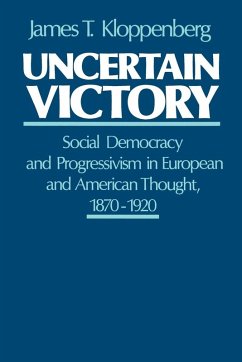This is the first comparative study of ideas and politics in France, Germany, the US, and Great Britain between 1870 and 1920 - a period when two generations of European and American intellectuals created a transatlantic community of philosophical and political discourse. In particular, it demonstrates how a number of thinkers from different traditions converged to create the theoretical foundations for new programmes of social democracy and progressivism. 'finely researched and imaginative survey ...an interesting and important contribution to the history of political philosophy.' Journal of American History
Between 1870 and 1920, two generations of European and American intellectuals created a transatlantic community of philosophical and political discourse. Uncertain Victory, the first comparative study of ideas and politics in France, Germany, the U.S., and Great Britain during these fifty years, demonstrates how a number of thinkers from different traditions converged to create the theoretical foundations for new programs of social democracy and progressivism. Kloppenberg studies a wide range of pivotal theorists and activists--including philosophers such as William James, Wilhelm Dilthey, and T. H. Green, democratic socialists such as Jean Jaures, Walter Rauschenbusch, Eduard Bernstein, and Beatrice and Sidney Webb, and social theorists such as John Dewey and Max Weber--as he establishes the connection between the philosophers' challenges to the traditions of empiricism and idealism and the activists' opposition to the traditions of laissez-faire liberalism and revolutionary socialism. By demonstrating a link between a philosophy of self-conscious uncertainty and a politics of continuing democratic experimentation, and by highlighting previously unrecognized similarities among a number of prominent 19th- and 20th-century thinkers, Uncertain Victory is sure to spur a reassessment of the relationship between ideas and politics on both sides of the Atlantic.
Hinweis: Dieser Artikel kann nur an eine deutsche Lieferadresse ausgeliefert werden.
Between 1870 and 1920, two generations of European and American intellectuals created a transatlantic community of philosophical and political discourse. Uncertain Victory, the first comparative study of ideas and politics in France, Germany, the U.S., and Great Britain during these fifty years, demonstrates how a number of thinkers from different traditions converged to create the theoretical foundations for new programs of social democracy and progressivism. Kloppenberg studies a wide range of pivotal theorists and activists--including philosophers such as William James, Wilhelm Dilthey, and T. H. Green, democratic socialists such as Jean Jaures, Walter Rauschenbusch, Eduard Bernstein, and Beatrice and Sidney Webb, and social theorists such as John Dewey and Max Weber--as he establishes the connection between the philosophers' challenges to the traditions of empiricism and idealism and the activists' opposition to the traditions of laissez-faire liberalism and revolutionary socialism. By demonstrating a link between a philosophy of self-conscious uncertainty and a politics of continuing democratic experimentation, and by highlighting previously unrecognized similarities among a number of prominent 19th- and 20th-century thinkers, Uncertain Victory is sure to spur a reassessment of the relationship between ideas and politics on both sides of the Atlantic.
Hinweis: Dieser Artikel kann nur an eine deutsche Lieferadresse ausgeliefert werden.








